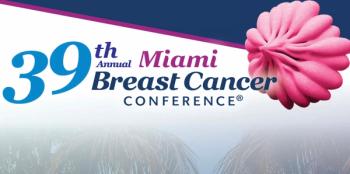
Charles L. Vogel, MD, FACP
Articles by Charles L. Vogel, MD, FACP


There is little that can be done toimprove on this excellentreview by Emensand Davidson.In particular, the section on the preclinicalpharmacology of trastuzumab(Herceptin) provides a concise summaryof the multiplicity of mechanismsattributable to this fascinatingcompound. One of those mechanisms-its immunomodulatory effectthrough antibody-dependent cell-mediatedcytotoxicity-has led not onlyto clinical trials of interleukin-2 (Pro-leukin), as cited by the authors, but toother investigative approaches as well.

The emerging era of targeted cancer therapies has focused laboratory scientists and clinicians on the need to define and understand molecular targets of novel drugs. For breast cancer patients and doctors, this trend is not news-efforts have been under way for decades to identify the estrogen and progesterone receptors and define the value of these markers as predictors of response to hormonal therapy.

This superb review by Drs. Kimmick and Muss clearly and concisely summarizes the literature on the prevention and treatment of breast cancer in "older" women.

Toremifene (Fareston) received FDA approval in 1997 for the first-line treatment of postmenopausal women with estrogen receptor (ER)-positive or -unknown metastatic breast cancer. Phase II and III trials have demonstrated that first-line therapy with toremifene, 60 mg/d, is as effective and as well tolerated as tamoxifen (Nolvadex), 20 or 40 mg/d, in such patients.

Breast cancer is second only to lung cancer as a leading cause of cancer mortality in women. In women with metastatic, hence, essentially incurable disease, we strive to find effective chemotherapeutic regimens that offer a

The definition of refractory advanced breast cancer remains elusive. Because of different definitions of objective response, frequent lack of precision in defining the number of prior chemotherapies, and differing interpretations
Latest Updated Articles
 8 TiP Randomized, Multicenter, Phase 3 Study to Evaluate the Combination of Enobosarm and Abemaciclib Compared With Estrogen-Blocking Agent for the Second-Line Treatment of AR+, ER+, HER2– Metastatic Breast Cancer in Patients Who Have Previously Received Palbociclib and an Estrogen-Blocking Agent Combination Therapy
8 TiP Randomized, Multicenter, Phase 3 Study to Evaluate the Combination of Enobosarm and Abemaciclib Compared With Estrogen-Blocking Agent for the Second-Line Treatment of AR+, ER+, HER2– Metastatic Breast Cancer in Patients Who Have Previously Received Palbociclib and an Estrogen-Blocking Agent Combination TherapyPublished: April 18th 2022 | Updated:
 Systemic Therapy for Older Women With Breast Cancer
Systemic Therapy for Older Women With Breast CancerPublished: March 1st 2001 | Updated:
 HER2 Testing and Correlation With Efficacy of Trastuzumab Therapy
HER2 Testing and Correlation With Efficacy of Trastuzumab TherapyPublished: October 1st 2002 | Updated:
 Phase II and III Clinical Trials of Toremifene for Metastatic Breast Cancer
Phase II and III Clinical Trials of Toremifene for Metastatic Breast CancerPublished: March 2nd 1998 | Updated:
 Current Status of Salvage Chemotherapy for Refractory Advanced Breast Cancer
Current Status of Salvage Chemotherapy for Refractory Advanced Breast CancerPublished: June 1st 1996 | Updated:
 Commentary (Vogel): Trastuzumab in Breast Cancer
Commentary (Vogel): Trastuzumab in Breast CancerPublished: August 1st 2004 | Updated:
